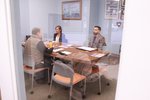
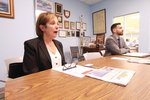
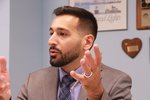
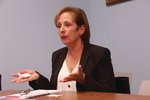
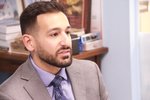
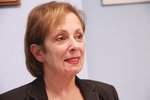
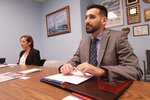
The Johnston Sun Rise invited Johnston’s three candidates for mayor to our newsroom for a forum on local issues.
Two of the three candidates accepted the invitation. One failed to show.
Polisena Jr. and Chadwick arrived promptly before noon Tuesday, Nov. 1, at our 1944 Warwick Ave., Warwick, Beacon Communications newsroom.
Leone would not confirm and did not attend the forum. She offered no reason.
Via email, Leone wrote: “Sorry not available.” By phone, she said she’d consider appearing at the forum.
Two serious candidates for mayor did show, however.
For an hour, Polisena Jr. and Chadwick answered more than a dozen carefully selected questions. Most of the questions, and their responses, follow.
Early voting has already begun and the Rhode Island General Election will be held on Tuesday, Nov. 8.
Voters will choose between Polisena, Town Council Vice President and son of current Mayor Joseph M. Polisena; Chadwick, a former business owner, local musician, massage therapist and political newcomer; and Leone, a local real estate broker.
The two candidates who attended the forum — Polisena Jr. and Chadwick — drew straws to see who would pitch their candidacy first. Chadwick drew the shortest straw and kicked off the forum.
INTRODUCTIONS
Each candidate was granted two minutes to lay out their experience, qualifications and introduce themselves to voters. Those opening statements were recorded and can be found at the Johnston Sun Rise’s website (CLICK HERE).
CHADWICK: “My name is Karen Cappelli Chadwick, and I’m running for mayor of Johnston. I’ve lived in Johnston for 65 of my 68 years, and I find that it has a wonderful sense of community. We’ve seen a lot of growth and some significant changes in the town. Some of them good. Some of them questionable to some of the residents. I’ve found my work history; every job I had, had something to do with people. I worked at a law office that was very political for 10 years. And I got a great civics lesson when I was there. And you listen and you learn. My last job was the best job that I had. I was a massage therapist and I got to work one-on-one with people. And I found all the times through my life, when you listen, you learn the most. It’s very important to know how people feel. And so during this campaign, I have walked and talked to lots of people. And they’ve been very receptive. And I ask them for a minute and I end up in 10 to 15 minute conversations with them. They’ve been very helpful, in what concerns them about the town; what they hope to see. I think that we need a little more community involvement in some of the bigger decisions that get made. And people sometimes feel like they’re not always heard. I think that I have to let them know, you know, we have a lot of things going on. There’s a lot of new development in town, and people want to know what’s going on and how it came about. I’m hoping to allow them a little more transparency, if I get the job. And let them know, this is it, this is what’s going on, tell me what you think.”
POLISENA: “My name is Joe Polisena, I’m running for mayor of Johnston. I believe out of all the candidates in this race, I’m the most qualified, most experienced, and the only one that has a track record of delivering results for Johnston. A little bit about myself; most importantly, I’m a father and a husband. I’m a graduate of Rhode Island College, Roger Williams University Law School, and I have my MBA from Providence College. I’m an attorney by trade; started off at the Rhode Island Public Defender’s Office. I was there for a few years. I left to start my own private practice, which I still have today. I’m also a municipal prosecutor for the city of Cranston, and I’ve been the Johnston Town Council Vice President for the past four years. And I really think the culmination of all these experiences help me not only learn, but understand the issues that matter most to the voters. Taxes, schools, public safety and town services: those are the four main issues that my campaign is focusing on. If elected, those will be the four main issues that I’ll focus on during my administration. And I hope we get a chance to talk about each and every one of those issues here today.”
Each candidate received 60 seconds to answer each question. Candidates reserved the right to offer a 30-second rebuttal to challenge an opponent’s answer.
Johnston Sun Rise Editor Rory Schuler served as questioner and forum moderator.
QUESTION 1: If elected mayor, how would you ease the burden of the town’s commuters during both morning and afternoon rush hours?
POLISENA: “I think we have to make infrastructure improvements. And I think one example of that is with Amazon … Them coming into the town, of course is going to mean more cars on the roads. You can’t lie to voters and say that’s not the case. But I think what’s going to really offset that, is the road improvements they’re doing to Johnston. They’re widening Route 6. They’re going to make a jug handle for the turns; I think the jug handle they put up on Reservoir really helps people making a left hand turn into that street. We have to remember that these roads were built — not only just in Johnston, but other communities — when Rhode Island was a primarily agricultural community. And, again, not just in Johnston, we’ve had businesses pop up all over the state. And unfortunately, the roads have not been properly upgraded with that. So, we need to work with the state, because these are state roads. And I feel like, if elected, I can get that done.”
CHADWICK: “I believe that the roads do need improvement and it’s very important because there is traffic stopped everywhere. Every town road that you travel, there’s lines and lines and lines of cars. I actually spoke to people who said they don’t go into the center of town any more because they can’t get through. They take secondary roads and they go shopping in other towns because they don’t want to deal with what’s happening in the center of Johnston. But they are state roads, so it needs to be a process done with the state, to get that accomplished.”
QUESTION 2: A large solar development was pitched for Johnston’s west end. Residents banded together and have been temporarily successful blocking the industrial solar field. Was that project a good fit for Johnston? How should Johnston treat future solar field proposals?
Chadwick: Solar is a pretty new industry, everywhere. Especially in our state and most importantly in our town. I believe that solar should be kept in industrial and construction areas. I found it a little sad that the residents had to hire a land-use attorney to defend their neighborhood. It was 100,000 solar panels … on parcels of property, and it was all zoned R40 for the most part. No one minds families moving in. No one thinks that’s a detriment. I know we need alternative energy. What I don’t understand, is how you quantify or qualify destroying some environment to protect the environment. And they were right in fighting it. It cost them a great deal of money, and they may still be fighting it in the future. There are other places: let’s put it on top of the Amazon building. How about Citizens Bank? How about the dump? There are places it can go. I realize that. There was this solar field that was placed across the street from my house on City of Providence property; it’s private property, they brought it in the back. When they say they are not going to ruin or disturb the habitat, that is not even possible. So the residents did the right thing.”
POLISENA: I think you need to look at each individual project on its own merits. And I think that the abutting residents and the residents within the surrounding area should have the final say, as what happened in the specific case you are talking about. I am a big supporter of renewable energy; in the year 2100, my son will only be in his 70s. I think that’s something that we really need to move on. But I will say, and again the residents in that area didn’t want that and I respect their decision, but that doesn’t mean that residents in other areas would not prefer solar to increased homes. And one thing that I just would like to address, and I try to have this conversation with people, when they see woods, they think open space. And it’s not. Most of it is zoned residential. And the town, nor anyone else has the legal authority to stop any developer or any contractor to build houses — they have to conform within the lot specifications — on that residential property.
FOLLOW-UP QUESTION: Which is better for the town: solar and non-residential land development or new home construction?
POLISENA: I would prefer non-residential development. Just because the burden is less on the tax system as a whole. Less cars driving on the road; particularly when you’re talking about solar. It’s less children in the school system. It’s not to say I’m against new families moving into Johnston, but I do think that the town is full. And I think that the state has a huge need to build housing, but they need to look to western Rhode Island. I think Johnston is actually the dividing line, where if you go east of Johnston, there’s not a lot of area to build. However, you go west of Johnston, there’s plenty of land for residential homes.
CHADWICK: “I believe that the backbone of the community is the residents. Although, more homes with more families would tax … tax as they say the school system. We’re working on new schools. The residents pay approximately 60 percent — a little more, a little less — of the town revenue. So it brings money into the town, when you have single family homes.”
REBUTTAL REQUESTED
POLISENA: “While it does bring money into the town, I do agree with that sentiment. You have to look at the net increase or decrease, and for a family … in the school system, it would be a net decrease to the tax base, because I believe it costs about $17,000 to educate them for the year; special needs is around 20-something thousand; and out-of-district special needs can be anywhere from $50,000 to $120,000 per year.”
QUESTION 3: The Town’s Comprehensive Plan expired in 2007 and is in sore need of an update. The town’s Planning Board plans to start a review and update process at tonight’s meeting. What are your top three goals that must be included in a town wide Comprehensive Plan, to ensure adequate planning going forward.
CHADWICK: “The town Comprehensive Plan, that stands because we haven’t updated it since 2007, is one that recommends rural west of 295; recommends combining … commercial without infringing upon the residential. We’re starting to see a sprawl come up Hartford Avenue. It once was quiet. And certainly the town needs business to survive. But little by little, more and more and more concrete; les and less and less of anything to promote, ‘Look at how pretty that is. Let’s bring this in to the town.’ Let’s go see where we can live where it will be a nice quiet community in a residential area. It’s just moving up and up and up. And it’s to the dismay … especially to the people who live in the west end, because they moved up there to get away from that close setting.”
POLISENA: “So number one would be to promote economic development. Number two would be to preserve the character of existing neighborhoods. And number three would be to protect open space. But I do want to make a comment about the Comprehensive Plan … Ever since the Fane Tower decision came out, it essentially neutralized the Comprehensive Plan. What I mean about that is that the Supreme Court held that … Let me back up a little bit. A Comprehensive Plan is an exhaustive list of goals. And in the Fane Tower case, when they looked at Providence’s Comprehensive Plan, Providence had something in there to promote economic development. They also had something in there to preserve parks and open space. When the Fane Tower was going up, obviously those two points were incongruent with each other. So what the court held in the Fane Tower is that the Zoning Board did have the authority to put the project through, because they ended up putting that amendment through, because it did follow an economic development, which was in the Comprehensive Plan. Let’s say, for the sake of argument, if economic development was not in that Comprehensive Plan, then it wouldn’t have satisfied that one need. In summation, I think the Fane Tower decision really ruined all the teeth of the Comprehensive Plan and I that the General Assembly is going to have some work to do in its enforcement of it.”
QUESTION 4: Do you support Johnston’s new school facilities plan? If not, what would you have done differently? If so, make the pitch to voters how the new schools will positively impact town residents of all ages.
POLISENA: “Oh, absolutely. I was the one who championed the bond. I think the schools in the town, all the schools, particularly the elementary schools, we have some of them that are over 100 years old. And I want to preface this by saying, it’s not the building that makes the child’s education. That’s between the child, the teacher, the curriculum — but it helps. And I think if you have state-of-the-art facilities, it makes the environment a lot easier for the child to learn in. It makes them a lot more comfortable. And I’ve always supported this school bond as a no-tax-increase-bond, and I will keep that pledge to the residents.
CHADWICK: “I think that the schools definitely need to be overhauled and combined a little bit. But I’ve talked to so many residents who are opposed to the idea of one giant grammar school. I talked to one woman who said she works in a school that has 500 pre-K through grade six children and it’s a logistical nightmare. So, if there were some schools that could be worked on to be improved, and certainly some of the older ones, they’re no longer efficient in their quest for education. The High School needs some work; Ferri Middle School needs some work. But it’s more about the curriculum. It is more about the interaction the students have with their teachers. And the kind of support they get if they needed. Covid knocked everything out of the park and people are still trying to get back on their feet from it, as far as education goes.”
QUESTION 5: The town has accumulated a fairly large reserve fund. Save it or spend it?
CHADWICK: “The most important thing is to make sure that all of our financial obligations are met. Whether they be for any number of fiscal issues. How are our pensions doing? How are our public works departments, and the police and the fire department? Are they operating at 100 percent? Do they have everything they need? The schools: they need to be brought up to where they feel like they’re in a good place; they’re in a comfortable place. We need … there’s so much that could be spent on, but we need to be taking care of the financial obligations which have already been in place first. And then the rest, save it for a rainy day.”
POLISENA: “So primarily save it. I’m fiscally conservative by nature. As I’ve identified before, financial institutions and ratings agencies recommend three months operating expenses in a reserve fund. Johnston has a $120.5 million budget. So it’s approximately 30 million we need to have in reserves for that rainy day. That leaves us about $11 million in money to spend, but that doesn’t mean that we just go out and spend it all at once. I think what we did this past fiscal year, is we drew down, from I think our surplus was $46 million, we drew down $5 million, we’re at 41 now. And that was to do our road improvement program. And I also think that if we do spend the money, whatever it’s spent on, it should not be spent on anything that has a recurring cost. It should be for one time improvements that don’t have that annual cost.”
QUESTION 6: What will you do as mayor to improve local government transparency? How will you improve communications between town government and the residents of Johnston?
POLISENA: “I think primarily the mayor has to have an open-door policy. I think that an open-door policy is critical for any mid-sized municipality like Johnston. I also want to invest a little bit more in technology. I think we need to upgrade our website. And we also need to do better on notifications. And one of the texts that I get most frequently, from my friends and neighbors, is ‘Is trash delayed for a day?’ And I think that we need to find a better way to get that message out to residents, so there’s less confusion, and things could be prepared for better. Specifically how we would do it, I would probably opt for a notification program. That doesn’t mean that it can be abused and you send one text message per day to residents. But you reserve it for things … like trash notification or maybe a parking ban. I think we need to invest more in technology.”
CHADWICK: “I think the most important thing we can do as mayor is listen. People often feel like they don’t get the information they need and it’s definitely due to technology. People want to be heard. They want to be talked to; they want to express themselves. You’re not going to make everybody happy all the time. But you can’t say, I don’t have time for this, or I’m not going … I just think that one-on-one conversation is the best way to get people community-wise aware, so that they can participate. If they participate, then they know. I think we have to change the structure of some of our meetings. If you want to ask a question of the Town Council, you have to put it in writing for the next meeting. We should have an open (forum) at the end, that everybody gets a little bit of time.”
QUESTION 7: Several times each year, the Town Council and School Committee meet at the same time, on the same day. It usually happens around holidays. Is that fair to residents? Would you commit, as mayor, to ensuring the town communicates with the school when planning public meeting dates, so interested members of the public can attend both, should they choose?
CHADWICK: “I would make sure that people knew what was going to happen, before it was going to happen. And if they cannot attend, one of the council members suggested live-streaming. Or, put it on a public access station. A lot of people have families. At 6 or 7 o’clock, is when most of these meetings occur. They’re feeding their kids. They’re making sure that they have their homework done. They can’t just up and say they’re going to the meeting and I’ll be back. Make it more accessible; we are in the age of information.”
POLISENA: “Absolutely. Like you mentioned, I believe that only happens on holidays. The town schedules these right at the beginning of the year, in January. I think the town would be able to coordinate with the school committee on that. But the School Committee does set its own agenda schedule. But I do think it’s important for the meetings not to fall on the same days.”
FOLLOW-UP QUESTION: Should public meetings be broadcast, recorded or live-streamed?
POLISENA: “There’s a difference between live-streaming and recording the meeting and then posting it online. If we do have live-streaming, with a Zoom link, we have to make sure that we’re in accordance with open meeting requirements … But I don’t see a problem with recording it and putting it online. And live streaming, again, I’m open to it. I’d have to see what the cost is and make sure it’s in accordance with the Open Meetings Act.”
CHADWICK: “I think that we agree on this. People need to be kept in the loop.”
Comments
No comments on this item Please log in to comment by clicking here